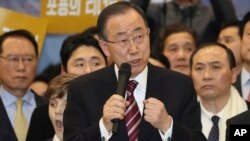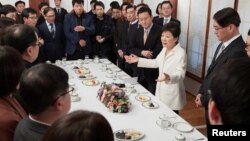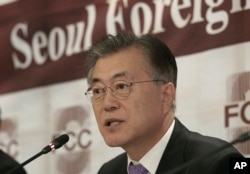Former Secretary-General of the United Nations Ban Ki-moon arrived back home Thursday in South Korea amid mounting expectations that he will run for president.
Ban was greeted by crowds of supporters at Incheon Airport near Seoul when he arrived in the early evening. When asked about entering the race for president, he would not commit, but he did indicate he is leaning in that direction.
"I have already said that I am ready to give my all [for the country] and my determination remains unchanged," he said to the cheering crowd.
Bribery charges
The former U.N. Secretary-General is highly regarded in South Korea for how he represented his home country on the world stage for the last decade. He is referenced in high school textbooks, and his biography, recounting his childhood struggles in war torn Korea to his rise as a world leader in charge of the United Nations, is a best seller.
Upon his return, however, Ban also found himself facing questions about his younger brother Ban Ki-sang and his nephew Joo Hyun Bahn, who were accused Tuesday in a Manhattan federal court of a scheme to bribe a Middle Eastern official for an attempted $800-million sale of a building complex in Vietnam.
Ban denied any knowledge or involvement in the alleged bribery scheme.
Political crisis
Once considered the heir apparent to the conservative President Park Geun-hye, Ban returns to a changed political landscape in his homeland.
President Park has been impeached by the National Assembly, and her reputation is in ruins over her alleged involvement in a multi-million-dollar influence peddling scandal.
The president is accused of colluding with her longtime friend, Choi Soon-sil, to force or bribe Korean conglomerates to donate more than $65 million to two dubious foundations.
Park’s single five-year term of office was to end in January of 2018, but if the Constitutional Court upholds the impeachment motion, then a new presidential election will be scheduled sometime in the next few months.
“I have a heavy heart. It is sad. Behind our global prestige we built, I realized that there is a dark shade deeply surrounding us. Our country is ripped, our economy has lost vitality and our society is tainted with corruption,” said Ban.
After carrying out weeks of massive countrywide protests to force Park out of office, the electorate is demanding real change in the form of greater political transparency and real economic reforms.
“There is a very humbling and undeniable recognition that the South Korean system is at a crossroads. The system that has contributed to rapid industrialization and gradual change toward liberal democracy seems to have reached a saturation point,” said political analyst Bong Young-shik with the Yonsei University Institute for North Korean Studies.
Election maneuvers
A number of progressive opposition candidates have declared their intention to run for president, including Moon Jae-in who, along with Ban, led the prospective field of likely South Korean presidential candidates with recent approval ratings hovering around 20 percent.
Moon has staked out populist economic positions calling for sweeping corporate reforms, and he wants to increase dialogue with North Korea to defuse tensions over its nuclear development program.
Ban, 72, was South Korean foreign minister from 2004-2006 under the liberal President Roh Moo-hyun, but was a non-partisan career diplomat.
He is now considered the best hope to unite the divided conservative party in the next presidential election, but he remains non-committal about running.
If he gets into the race, Ban will need to more directly address the ongoing political turmoil and present his own plan for economic growth and job creations.
“Foreign policy is his major strength and his major currency, but foreign policy cannot help him win the presidential election,” said Bong.
'Comfort Women'
Like Hillary Clinton, who recently lost the U.S. presidential election, Bong said, the established diplomat’s position and experience could work against him in a changed election year.
Ban’s past support as Secretary-General for the 2015 “comfort women” settlement could become a liability. "Comfort Women” refers to the over 200,000 women throughout the Pacific region who were forced into prostitution by the Japanese military during both WWII and Japan’s colonization of Asia.
The deal reached between President Park and Japanese Prime Minister Shinzo Abe relieved Japan of any further responsibility and liability for all past wartime grievances in return for a written apology from Abe and a pledge by Tokyo to provide $8.9 million to support the surviving victims.
Tokyo also asked for Seoul to remove a “comfort women” statue that has been placed across the street, where activists hold weekly rallies denouncing Japan’s wartime atrocities.
The settlement was denounced by “comfort women” advocates and is unpopular with a large segment of the public. The recent placement of a second “comfort women” statue in front of the Japanese consulate in the South Korean city of Busan has reignited the conflict.
Japan this week recalled its ambassador and consul general to South Korea, and last week suspended currency swaps with its neighbor.
Ban said Thursday that while he supported the agreement, it is still “incomplete” and the concerns of the surviving victims must be addressed until they are satisfied.
Youmi Kim contributed from Seoul.


